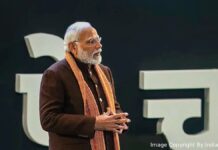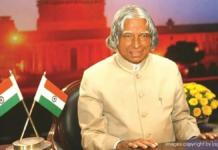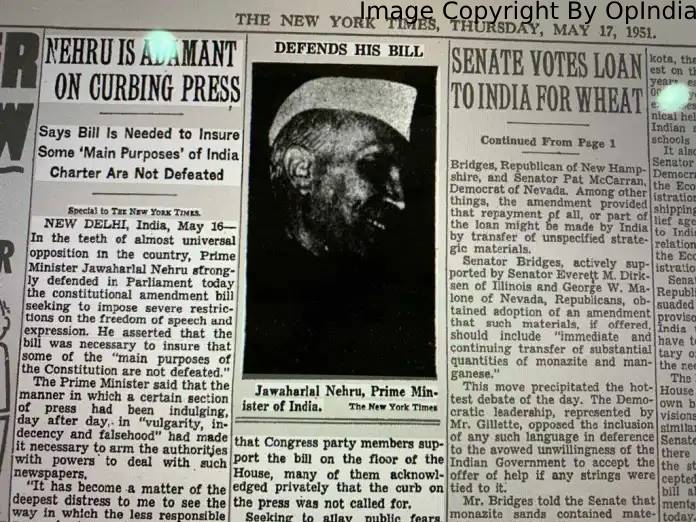It was in 1951 that India’s first Prime Minister, Jawaharlal Nehru, amended the Constitution for the first time, because the “Constitution came in the way” of urgent social changes. A look at what led to the first amendment of the Constitution, which curtailed the absolute freedom of speech.
“It is impossible to hand up urgent social changes because the Constitution comes in the way. We shall have to find a remedy, even though this might involve a change in the Constitution,” wrote an exasperated Jawaharlal Nehru, India’s first and then Prime Minister, to the chief ministers in early 1951.
In the early days of the Republic, facing relentless attacks from the RSS’s Organiser and Left’s Cross Roadsand seeing that absolute freedom of speech was creating an environment of animosity, Nehru set about amending the Constitution for the first time. Article 19 (1) (a) was in his crosshairs.
Article 19 (1) (a) of the Indian Constitution, granted, and still grants the freedom of speech and expression to Indian citizens, enabling them the liberty to freely express their thoughts, opinions, and ideas.
A look at the first amendment is particularly interesting because of the political attacks and counter-attacks on the bid to change the Constitution and attempts to curb freedom of speech.
The Congress, especially its leader Rahul Gandhi, has been alleging that the BJP-RSS was trying to change the Constitution. It also claims that freedom of speech has taken a beating under Prime Minister Narendra Modi.
This has drawn sharp rebuttals from the BJP and its leaders.
On Thursday, PM Modi accused the Congress governments of Jawaharlal Nehru and Indira Gandhi of attacking freedom of speech. He reminded the Congress about the arrests of lyricist Majrooh Sultanpuri in 1951 and actor Balraj Sahni in 1949, as well as the ban on Dev Anand’s films on Doordarshan during the Emergency.
The Constitution has been amended over 100 times now. And the first amendment was brought about by the first prime minister, Nehru.
The other provision that was also amended through the first constitutional amendment act was Article 31. This enabled agrarian land reform. But in this History of It article, we will focus on the amendment that put restrictions on freedom of expression.
WHY NEHRU FELT THE NEED TO AMEND INDIA’S CONSTITUTION
The founding fathers didn’t have as much time as they would have wanted to, to debate and put together the Constitution.
Rights come with guardrails and can’t be unrestricted. Fundamental rights enshrined in the Constitution, including freedom of speech, were absolute. Little did the founding fathers, including Nehru, know that unbridled freedom would leave it open for abuse and cause difficulty later.
An incident of February 8, 1950, marked a decisive moment in India’s constitutional history, as the Bombay High Court struck down the indefinite detention of 28 alleged Communists under the Bombay Public Safety Measures Act, affirming that fundamental rights applied to all existing laws.
Arrested in 1949 without trial, the detainees challenged their imprisonment after the Constitution came into force in January 1950, citing Article 22’s limits on preventive detention. The court rejected the Bombay government’s defence and upheld constitutional protections, reinforcing judicial oversight over state power. This case became a key example of how ordinary citizens used the Constitution to challenge government authority, which would later upset the Centre.
CArrested in 1949 without trial, the detainees challenged their imprisonment after the Constitution came into force in January 1950, citing Article 22’s limits on preventive detention. The court rejected the Bombay government’s defence and upheld constitutional protections, reinforcing judicial oversight over state power. This case became a key example of how ordinary citizens used the Constitution to challenge government authority, which would later upset the Centre.
Content Copyright India Today




















